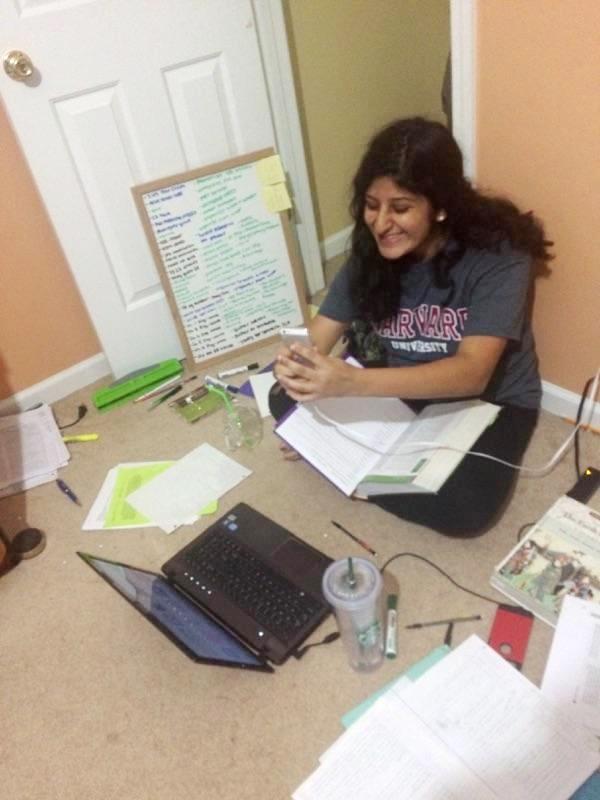Distractions keep teens from good night’s sleep
Sophomore Aliza Ali takes a Snapchat photo in the late evening hours instead of using her time to complete that night’s homework assignments.
April 3, 2015
Sophomore Caitlyn Patterson heads home after a seven-hour school day to do homework for each of her seven classes. She begins with the subjects she finds most difficult, like Chemistry and Analytic Geometry, and then works her way to Spanish III, Health Care, World Literature and World History.
“It feels like I am working forever, and I rarely get enough sleep,” Patterson said.
Patterson is a typical teen and, like many of her peers, doesn’t receive the recommended hours of sleep. Studies over the years have shown that sleep is a vital part of development in the teenage years because it is the most efficient way for the brain to repair and restore lost energy. The National Sleep Foundation recommends at least eight to 10 hours of sleep, but only 15 percent of the country’s teens receive this amount.
The two main factors that contribute to that deprivation are homework and technology. A surplus of school work and distracting social media sites cuts into the hours teens sleep each night. The pattern begins with students having the intention of using the Internet for homework, but distracting apps like YouTube, Instagram and many games can turn 10 minutes to two hours. “Instagram and Twitter are the most distracting apps for me,” freshman Austin Schriver said.
Senior Selena Flowers said she balances her time between her school work and her boyfriend, who is a senior at Henry County. Flowers spends hours texting on the app Kik. The couple also converses over the phone well into the night. “Most of the time we talk until we fall asleep,” Flowers said. “The next day I’m super tired and I want to fall asleep in class,” she said, and her grades have dropped slightly as well.
Sophomore Jillian Ruvalcaba plays on the school’s junior varsity volleyball team and for Volley One, a local club team, during the off season. Practice for Volley One starts at 7:30 p.m. and ends at 9:30 p.m. On a typical school night, Ruvalcaba doesn’t go to bed until after midnight.
“I always feel tired,” Ruvalcaba said, “and I usually fall asleep on the bus on the way to school.” She admits that she uses a large chunk of her homework time to check social media and surf the Internet. Apps like Pinterest, Instagram and Snapchat keep her up for hours. “I usually don’t go to bed until my battery is almost dead,” she said.
Senior Matthew Reindl, a Fine Arts student, feels like homework is his second job mainly because “theater has always come first.” Reindl participates in Advanced Drama II and the annual musical. During last fall’s production of “The Addams Family,” Reindl said he found himself overloaded because of daily rehearsals that often lasted until 10:30 p.m., which conflicted with his academic work. “By the time I finished my homework, it was 1 a.m.,” he said. “The amount of sleep I received definitely suffered.”
Sophomore Brittany Mathews said she noticed a correlation between the amount of sleep she received the previous night and her performance in her classes the following day. “[When I lose sleep] I’m less focused and less talkative,” Mathews said. In one instance, Mathews said she was too tired to focus on a World History test, and she confessed to receiving a “subpar score.”
Junior Arisha Ali, who attends weekly Math and SAT tutoring in addition to church activities and Color Guard practice during marching band season, said all her energy is taken up by the weekend. “I have weird sleeping habits. I toss and turn at night and on weekends my eyes open automatically, usually around 9 a.m.,” Ali said. Ali indulges in Starbucks coffee four times a week to keep herself alert during after-school tutoring.
Ali’s sister, Aliza, has a similar schedule and also experiences odd hours of sleep. “During the week I often stay up until 2:30 a.m. just to finish homework,” she said.
In a survey of 20 students conducted by Prowler reporter Taylor Milligan, 45 percent said that they went to bed between 10:30 and 11:30 p.m., and 35 percent hit the hay between 11 p.m. and midnight. This habit gives them, on average, five to six hours of sleep if they wake up between 6:30 and 7 a.m.
Although students are accustomed to receiving less sleep than recommended, junior Susannah Henderson still feels exhausted. “School really wears me out,” she said. “When I start out the day, it is extremely hard for me to engage with my surroundings.”
Despite suffering through the negative effects of sleep deprivation, students continue to go to bed late and wake up early.
“We know eight hours of sleep is important and what is considered healthy, but most of us are willing to sacrifice it if it means getting into our dream college,” Arisha said. “For me, what it boils down to is the success from all my hard work, and when I get into Davidson, I’ll know that my long nights paid off.”




